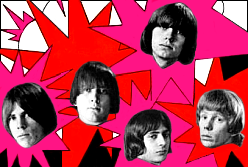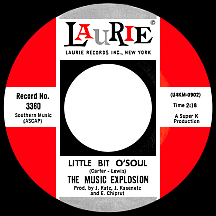THE MUSIC EXPLOSION
Little Bit O'Soul
Mansfield, Ohio had an active rock scene in the 1960s, or so a sizeable number of then-teenaged, maniacal music fans who grew up there have claimed. A tight mid-decade outfit called Kings English played regular gigs in area dancehalls. Two of the band's members, guitarists Richard Nesta and Don "Tudor" Atkins, hooked up with singer Jamie Lyons, bassist-keyboardist "Butch" Burton Stahl and drummer Dave Webster in early '66, called themselves The Chosen Few, and made a snap decision to trust a local music manager-hustler named Andy Apperson, who took them to New York City that summer, where they auditioned for the production team of Jeff Katz and Jerry Kasenetz. The quintet henceforth wound up having to make the best of an anemic moniker, The Music Explosion. They had a million-selling hit...and afterwards were basically doused, wrung out and hung up to dry. Bitterness ensued.
Brooklyn music managers Katz and Kasenetz, under the Super K Productions banner, produced three singles by Christine Cooper in 1966 for Philadeliphia's Parkway Records ("S.O.S. (Heart in Distress)" the best-known), but lack of success messed with K&K's momentum. The situation improved after the fateful Chosen Few audition. First, the newly-christened Music Explosion appeared on Attack, a Super K label, with an imitative remake of "Little Black Egg," originated by Daytona Beach band The Nightcrawlers, a late-'65 hit in the group's Florida stomping ground and a few other regions.
John Carter and Ken Lewis of British band The Ivy League (Parkway's sister label Cameo issued their singles in the States) had made a demo of their song "Little Bit O'Soul," not exactly something Jamie and his Mansfield pals imagined as their own, but Jeff and Jerry insisted they do it. The nicely raucous track (thanks to Jamie's naturally rough-edged lead vocals and furious drum backing by an uncertain contributor), became one of 1967's biggest hits; it peaked at number two in May (behind "Windy" by The Association) and went on to sell over a million copies. The record company, Laurie, didn't bother to order gold plaques from the RIAA for the band members. Nevertheless, Stahl (not-so-?)-proudly displayed one in his home...a homemade one, that is, a copy of the 45 that he'd spray-painted gold and framed himself!
Having zero song choice became the norm for the Music Explosion; it was just the way K&K worked. Drummer Webster wasn't able to bask in the momentary glory of having a major hit, as his parents had convinced the slightly younger fifth wheel to give up his rock and roll dreams and stay in school. Financially, at least, his abdication didn't affect him one way or the other. Don Avery, at 20 slightly older than the others, replaced him shortly after the hit single was finished; his ability to play guitar or blow a mean harmonica riff occasionally came in handy. The Little Bit O'Soul album was completed in an accelerated timeframe; K&K had Jamie sing lead on several pre-recorded tracks, flying him to New York on more than one occasion, which meant leaving the road-touring band temporarily without the lead vocalist required to make their "Little Bit" hit sound right onstage. Other studio songs featured various band members and at no time was anyone given control over...anything. Including the liner notes by one mysterious Marcia Hillman, who misspelled Burton Stahl's name as "Sahl." In an interview with a deejay friend of mine who once worked at a station in Mansfield, Stahl said he figured they would get it right on the second LP. Even without a crystal ball, you could imagine how that would turn out!

The follow-up single, "Sunshine Games," a catchy but less gutsy effort, disappointed chartwise...but not like the next six were gonna. Around this time, Katz-Kasenetz reversed the order of their own billing (because it's easier to...spit out that way, I guess) and found an outlet for another Mansfield group, The Ohio Express (or Sir Timothy and the Royals with yet another generic name-change...then again, what was it with these Buckeye bands and their British-sounding appellative identifiers?). The M.E.'s "We Gotta Go Home," a Bo Gentry-Ritchie Cordell tune, came off ever-so-slightly closer to what would soon be a full-blown movement called "bubblegum music" spearheaded by Kasenetz-Katz by way of a host of similarly-manipulated bands on the newly-established Buddah label. Many huge hits resulted (1910 Fruitgum Company made out best), but the Music Explosion, still on Laurie, didn't accompany those "Yummy Yummy," "Goody Goody" hitmakers to the upper tier of national sales and airplay surveys.
Not that their later efforts weren't interesting. "What You Want (Baby I Want You)," written by former "Baby Sittin' Boogie" belter Buzz Clifford, has an in-your-face psychedelic vibe and "Where Are We Going" (Mickey Lee Lane penned it) certainly went against the prevailing bubblegum grain, while "Yes Sir" (a Joey Levine-Kris Resnick number) snuggled right up to the "Chewy" bubblegum sound and embraced it. Consistency was nonexistent (not always a bad thing, but in this case...) and the honest info on who-did-what on these '67 and '68 sessions may never be ironed out. All five band members made at least minimal contributions to an all-inclusive project, The Kasenetz-Katz Singing Orchestral Circus (with its snarkier-than-usual Levine lead vocal on hit single "Quick Joey Small (Run Joey Run)").
As the decade waned, the band slowly collapsed. Bob Avery became a K&K Kool-Aid drinker, drumming for Crazy Elephant ("Gimme Gimme Good Lovin'") and other movable-parts Super K acts. Jamie Lyons sang for The Capital City Rockets around 1973; one of their singles on Elektra was a thing called "Little Bit O' Fun," which I suppose he was having more of at the time. Explosion reunion shows, put on by two or three at a time from the original lineup, occurred regularly at some point. Group members, particularly Burton Stahl, complained for years about the haphazard way the crafty K&K made records and the practice of paying pennies in place of dollars. Someone made a lot of money between 1966 and 1970; it just wasn't The Music Explosion.


